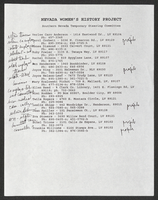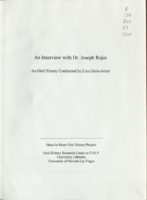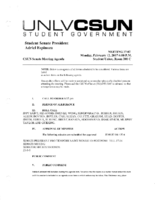Search the Special Collections and Archives Portal
Search Results

Dr. Javier A. Rodríguez oral history interview: transcript
Date
Archival Collection
Description
Oral history interview with Dr. Javier A. Rodríguez conducted by Elsa Lopez and Barbara Tabach on December 19, 2019 for the Latinx Voices of Southern Nevada Oral History Project. Dr. Javier Rodríguez, Biology Professor at the University of Nevada Las Vegas, talks of his personal and educational history that led him to UNLV. He discusses his migration from Puerto Rico to California where he received his PhD from the University of California Berkley and became a biological museum curator for various animal specimens. He later moved to Las Vegas to teach at UNLV where he has now been for nearly two decades; Dr. Rodríguez shares how UNLV has changed since he first started working here, including the university's increased interest in faculty research to become a Top Tier institution. Subjects discussed include: Puerto Rico; University of California Berkley; University funding; Tier 1 research institutions.
Text

Nevada Women's History Project organizational records
Date
Archival Collection
Description
Folder from the Nevada Women's History Project Records (MS-00406).
Text
John Vellardita (Clark County Education Association) oral history interview conducted by Magdalena Martinez: transcript
Date
Archival Collection
Description
From the Lincy Institute "Perspectives from the COVID-19 Pandemic" Oral History Project (MS-01178) -- Education sector interviews file.
Text

Transcript of interview with Dr. Joseph Rojas by Lisa Gioia-Acres, September 30, 2008
Date
Archival Collection
Description
Dr. Joseph Rojas, born 1933 in Alexandria, Louisiana, was the son of Joseph Edward Rojas and wife Carroll. He graduated high school at age 16 and entered Loyola University of the South. Two years later he was accepted at Louisiana State University School of Medicine, graduating with a medical degree in 1957. He interned at Charity Hospital and then completed his OB-GYN residency at Tulane University. Several mentors worked with Dr. Rojas during his residency and he recalls learning surgical and bed-side skills from the likes of Dr. Lynn White and Dr. Fred Janson. He also remembers the very high volume of patients - up to 300 - that he and other residents saw daily. Dr. Rojas married Mona Robicheaux, RN, during his residency and afterwards joined the Air Force. He and his family — they eventually had six children — were stationed at Nellis Air Force Base, arriving in Las Vegas in 1961. He was chief of OBGYN and deputy hospital commander while at Nellis and then served as chief of OBGYN at Southern Nevada Memorial Hospital until 1972. He later served as chief of staff at Women's Hospital and Valley Hospital, and was the first chief of staff at Summerlin Hospital. Dr. Rojas also maintained a private practice outside of the hospital. His wife worked alongside him in his office, and they share memories and anecdotes of the patients they saw and the general atmosphere of the medical community. Both Joseph and Mona agree that Las Vegas hospitals were less racially segregated than the hospitals in Louisiana, and felt that the West was more open to integration. In 1966 Dr. Rojas started the first OB-GYN residency in Nevada, which led to the development of the University of Nevada School of Medicine. He was a researcher, lecturer, teacher, and author. He earned many awards, including the Harold Feikes MD Award for Outstanding Physician in Clark County (2001), and the Nevada State Medical Association Distinguished Physician Award (1980). Dr. Rojas passed away in May of 2009, leaving behind an incredible legacy of service to the residents of Clark County.
Text

Miguel Villarba oral history interview: transcript
Date
Archival Collection
Description
Oral history interview with Miguel Villarba conducted by David Islas on December 6, 2021 for Reflections: The Las Vegas Asian American and Pacific Islander Oral History Project. In this interview, Miguel Villarba shares his family's history growing up in Manila, Philippines and immigrating to the United States in 2016. He talks about first living in Chattanooga, Tennessee before moving to Las Vegas, Nevada to be near family when Miguel was in high school. Miguel Villarba shares stories of his grandfather's farm in Pangasinan, Philippines, the differences in city and town life across Manila, Chattanooga, and Las Vegas, and his educational plans. He also talks about Filipino culture and traditions, and racial discrimination.
Text

Photographs of Rummel Motel sign, Las Vegas (Nev.), February 23, 2017
Date
Archival Collection
Description
Site address: 1809 S Las Vegas Blvd
Sign owner: Yeh Chia-Hong
Sign details: The motel was founded by Marvin Rummel in 1945 (VintageLasVegas, n.d.), although the Clark County Assessor lists the original construction year as 1951 (Assessor, n.d.). Undated vintage postcards, one describing the motel as "new" (Rummel Motel, 1809 So. 5th St. U.S. 91 - L.A. Highway Las Vegas, Nevada original vintage postcard, n.d.) show that a two-story building was later added to the back of the motor court (VintageLasVegas). The addition may explain the discrepancy in construction dates. The Roles family purchased the property in 1958 (VintageLasVegas; Noted bowler, hotel owner dies, 2002). Ralph Roles also operated the Del Mar Motel (the Del Mar's sign, designed by Betty Willis, is now at the Neon Museum). A vintage postcard from 1958 shows that motel was endorsed by the Automobile Association of America and another automobile club (Garofalo, 2011). The motel was severely damaged by fire on April 30 2017 (VintageLasVegas; Hershkovitz, 2017) and is currently closed.
Sign condition: The condition is 2, fair. The lower portion of the cabinet is dented and access panels are damaged or missing. The upper portions of the cabinet display numerous metal patches. The plastic on the reader board has holes. The remaining neon tubing appears to be intact. All incandescent light bulbs are missing.
Sign form: Pylon sign
Sign-specific description: The sign is supported by a rectangular blue metal pylon. A blue metal-framed reader board and orange metal upper cabinet are cantilevered out from the pylon toward the street. In the center of the upper cabinet is an amoeba-shaped area which is painted black and outlined by white skeleton neon. Inside the black amoeba are individual cursive letters which spell out "Rummel Motel" in white paint traced by white skeleton neon. Atop the upper cabinet is a smaller orange metal cabinet which is wing-shaped. Above the wing is a blue metal circle. Inside the channel of the circle are six concentric circles of empty light sockets. On the outside of the circle is a semi-circular metal frame which holds five white skeleton neon five-pointed stars.
Sign - type of display: Neon, incandescent and reader board
Sign - media: Steel and plastic
Sign - non-neon treatments: Incandescent light bulbs and a reader board
Sign environment: This is located on Las Vegas Boulevard South just north of the Las Vegas Strip
Sign - date of installation: The current sign dates back to at least 1958, but probably is not the original motel sign. A vintage postcard shows that before the two-story addition, the motel had a simple double pole sign with the name "Rummel Motel" enclosed by an open oval (Rummel Motel, 1809 So. 5th St. U.S. 91 - L.A. Highway Las Vegas, Nevada original vintage postcard, n.d.). The colors, lettering style and oval shape of the former sign appear to have inspired the design of the sign seen in a postcard from 1958 (Garofalo, 2011). The latter sign, with heavy modification, is the sign seen on the property today. The sign as currently configured is recognizable in a postcard from the late 1950's or early 1960's (Las Vegas motels then and now, n.d.).
Sign - date of redesign/move: The circa 1958 sign (Garofalo, 2011) was supported by double poles. The pole on the street side of the sign can still be seen on the upper cabinet, but it no longer reaches to the ground. The pole on the motel side of the sign ran from the ground toward the center of the sign, and then doglegged inward toward the motel to support the sign from the side. That pole appears to be the same one now enclosed by the pylon. The shadow of the pole can be seen inside the current reader board, which was a later addition attached below the circa 1958 sign. Automobile club shields at the bottom of the circa 1958 sign have been removed. A black metal directional arrow pointing toward the motel from the street side of the sign has also been removed. A circular white or light yellow metal cabinet with concentric rows of incandescent lightbulbs in the interior and a semi-circle of neon stars on the exterior has been moved from the top of the former directional arrow to the top of the wing-shaped cabinet. The circa 1958 wing-shaped cabinet was flush with the street side of the sign and contained skeleton neon which advertised, "HEATED POOL". The current wing-shaped cabinet contains no neon and has been pushed to the center of the sign. The lower cabinet of the circa 1958 sign was painted orange and black, which is now all orange. The amoeba shape was painted blue and is now black. Below the amoeba were skeleton neon letters which spelled out, "NO VACANCY" and "24 HOUR ROOM SERVICE". The neon is now gone. A small black metal cabinet attached at the bottom of the sign contained what appear to be either painted or skeleton neon letters which state, "COOLED BY REFRIGERATION". That portion of the sign is now gone.
Sign - thematic influences: This sign showcases 1950's and 1960's Googie trends. This also conveys earlier motor court designs in the building and the sign.
Survey - research locations: Clark County Assessor, Parcel No. 162-03-310-007, Retrieved from http://www.clarkcountynv.gov/assessor/Pages/PropertyRecords.aspx?H=redrock&P=assrrealprop/pcl.aspx Garofalo, M. (2011 November 2). Still standing-Rummel Motel. Retrieved from https://www.flickr.com/photos/vintageroadtrip/6304823598/ Hershkovitz, R. (2017 April 30). Fire damages vacant downtown Las Vegas motel. Las Vegas Review Journal. Retrieved from https://www.reviewjournal.com/local/local-las-vegas/downtown/fire-damages-vacant-downtown-las-vegas-motel/ Las Vegas motels-Then and now. (n.d.). Rummel Motel. Retrieved from http://stefanidrivesvegas.com/8.html Noted bowler, motel owner Roles dies. (2002 July 30). Las Vegas Sun. Retrieved from https://lasvegassun.com/news/2002/jul/30/noted-bowler-motel-owner-roles-dies/ RoadsideArchitecture. (n.d.) The Rummel Motel. Retrieved from http://www.roadarch.com/signs/nvvegas3.html Rummel Motel, 1809 So. 5th St. U.S. 91 - L.A. Highway Las Vegas, Nevada original vintage postcard. (n.d.). Retrieved from https://www.amazon.com/Rummel-Motel-1809-So-U-S/dp/B00P9LEQCS VintageLasVegas. (n.d.). Rummel Motel. Retrieved from http://vintagelasvegas.com/post/160953547509/rummel-motel-1809-s-las-vegas-blvd-built-by
Surveyor: Mitchell Cohen
Survey - date completed: 2017-09-18
Sign keywords: Pylon; Neon; Incandescent; Reader board; Plastic; Steel
Mixed Content
Stacy Smith and Sofia Allison (Nye Communities Coalition) oral history interview conducted by Kelliann Beavers and Elia Del Carmen Solano-Patricio: transcript
Date
Archival Collection
Description
From the Lincy Institute "Perspectives from the COVID-19 Pandemic" Oral History Project (MS-01178) -- Community organization interviews file.
Text

Meeting minutes for Consolidated Student Senate, University of Nevada, Las Vegas, February 12, 2007
Date
Archival Collection
Description
Text

Transcript of interview with David Wasserman by Barbara Tabach, October 21, 2016
Date
Archival Collection
Description
For nearly two decades between 1950 and 1970, only one dentist of Jewish ancestry was known to be licensed to practice in Nevada. That was Dr. Joe Chenin. Finally, in 1971, the steadfast and easy mannered Dr. David R. Wasserman (1944 - ) broke through the barrier to become the second Jewish dentist serving the Las Vegas community. Over the following years, Dr. Wasserman built a sizeable following and immersed himself in the Jewish community of Las Vegas. Among his achievements is his participation and leadership in the formation of Las Vegas’ first Reform Jewish synagogue, Congregation Ner Tamid. He also would be active in the Jewish Federation. In 1992, as the HIV-AIDS epidemic affected dental offices throughout the nation, Dr. Wasserman saw an opportunity to get ahead of the infection. With the help of his wife Juanita Davis-Wasserman and his father-in-law Warren Davis, he developed, patented, manufactured and distributed a disposable tip for a treatment instrument commonly found in dental offices called a tri-syringe. This disposable tip brought sanitary options and great financial fortune to Dr. Wasserman and his family. In this oral history, Dr. Wasserman reflects on his joy of living in Las Vegas. He is a highly regarded dentist and leader in the Jewish community.
Text

